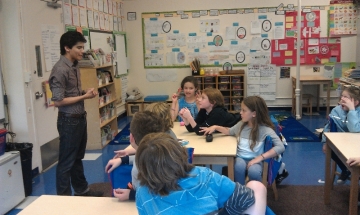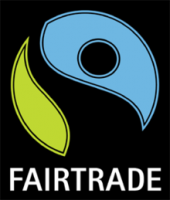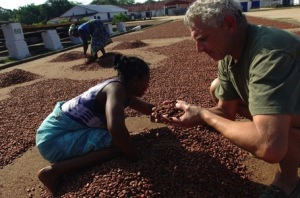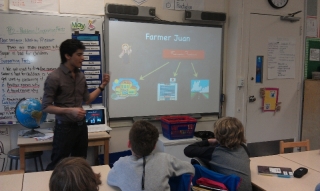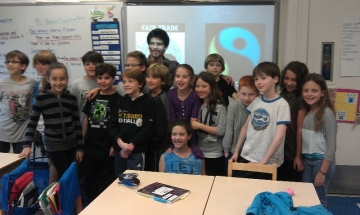Today’s blog post is a special entry written by guest blogger, and Chelsea Market Baskets Store Manager, Angelo. Â He recounts a recent visit to a New York City school to speak with the students about fair trade- and was pleasantly surprised by the sophisticated thinking and questions about fair trade and sustainability happening in the third grade classroom. Â Chelsea Market Baskets supports many vendors with Fair Trade certification, and we are thrilled to have our team members continue the conversation outside of our four walls.Â
Imagine an eight-year-old giving you a rundown of fair trade practices and sustainable agriculture in third world countries. Can’t picture it? Head over to New York City’s Columbia Grammar and Preparatory School, ask Ian, Cameron, or Arya from Ms. Avena’s third grade class for a lesson on biodiversities in farming in tropical climates, and see for yourself. I sure did.
This week I had the wonderful opportunity to stop by CGPS to speak to three third grade classes about the importance of fair trading practices of Chelsea Market Baskets’s favorite indulgence: chocolate. You know that here at CMB a product must have our stamp of approval before it hits our shelves. We believe in the value of fair trade to ensure not only ethical labor practices, but also a good product that’s been well crafted and tastes great because of it.
CGPS third graders were learning all about the significance of sustainable farming and the magnitude of deforestation, and were wondering what they can do to help add their little grain of sand. I spoke to them about how some companies, like Francois Pralus Chocolatier,
are certified fair trade chocolate makers that are voluntarily assessed and reviewed to make sure of two things: that the farms from which they are sourcing their cocoa beans are following fair labor practice, and that the farmers are being paid fairly for their products. The kids learned that while fair trade may not necessarily secure cash for farmers, premium sums of sale profits go to building new schools, hospitals, and roads for farms in needy countries.I also told the kids how some companies are not certified fair trade, but they ensure good business practices by trading fairly. Prestat—our exclusive import from England—for example, lets farmers know basically how the chocolate industry is doing via text messages through information from an unaffiliated, trusted website. This way, a farmer can decide whether or nor to sell his product and at what cost, depending on the current demand. What farmers get from this is exactly the amount of cash they ask for.
The class questioned me down with inquiries of how many companies are certified fair trade, what kind of products we carry at CMB that apply fair trading practices, and what they can do to help. Simple: stop by CMB, check out the back labels of the products we carry, and discover how slowly but surely more and more companies are taking conscience on issues like deforestation and child labor. By buying products that are certified fair trade, traded fairly, artisanal, or grown organically, we can help with farming land development in countries stricken with poverty through sustainable farming and just labor.
The kids promised to come visit me in the store so I can show them all the wonderful and tasty products we carry that are manufactured fairly, from chocolate to tea to cookies; they might have been a bit more inclined to do so after having a little taste of our Prestat Smooth Milk Chocolate. I invite you to do the same. Come question me like Ms. Avena’s third graders did and let me show you our wide selection of products that are helping—little by little and quite literally—make the world happier.
And when you stop by, don’t forget to ask me for a taste of chocolate.

